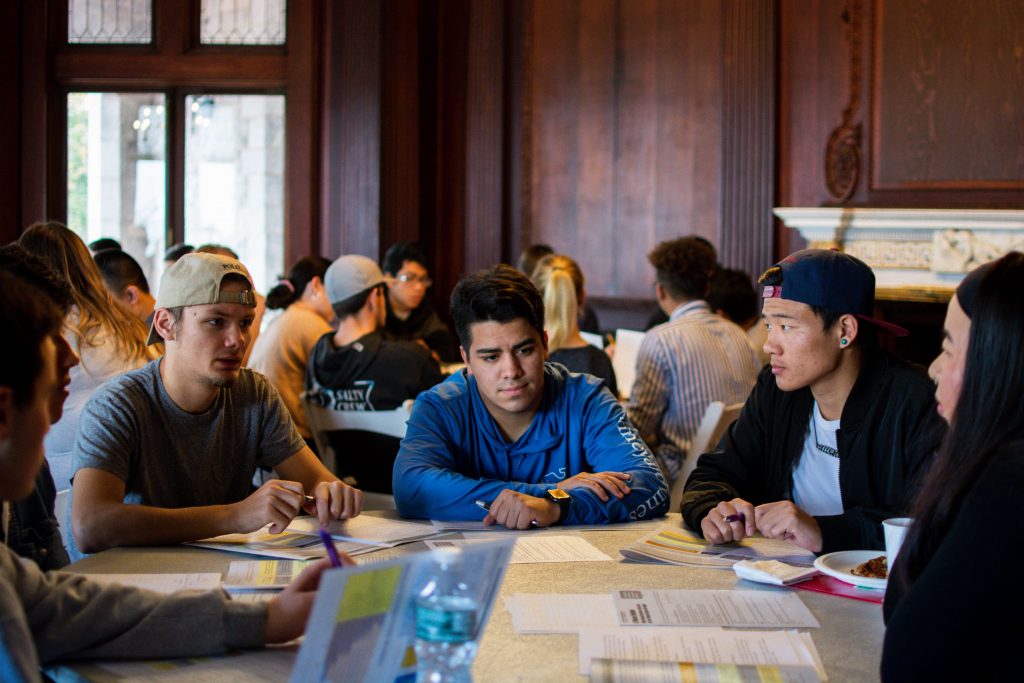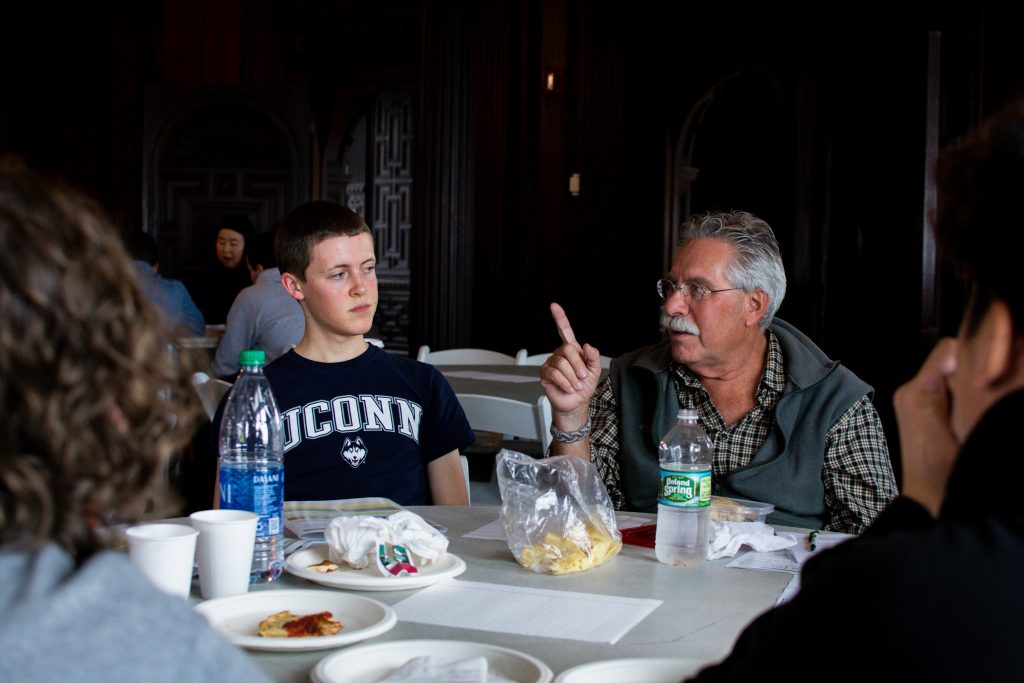AVERY POINT GLOBAL CAFE
Local Environments, Global Citizens
Written by Nicholas Hampton, Multimedia Project Specialist
October 25, 2019
A survey by the nonpartisan Pew Research Center in December 2017 found that just 18 percent of Americans said they trusted the government in Washington to do what’s right “just about always.”
A widespread lack of confidence in the American political system might point to a larger issue, a lack of conversation. The Avery Point Global Cafe focused on fixing a broken political system by exploring unbiased facts through deliberating dialogue on Tuesday, October 22 at the Branford House.
There was so much interest in the event that co-coordinators Laurie Wolfley, Rebecca Troeger and Katharine Richards had to change the venue for more space.
“We have the ability to show students that their voices are important, that they have important things to say and that they have an audience who’s eager to hear them,” says Troeger, an Academic Center Program Assistant at Avery Point.
 One hundred faculty and students attended the dialogue entitled “A House Divided: What Would We have to Give Up to Get the Political System We Want?” Co-sponsored by the Thomas J. Dodd Research Center’s Democracy and Dialogues Initiative and the National Issues Forums Institute. Engaging in critical dialogue is crucial in the wake of the country facing major problems like national debt, fewer people voting and participating in public life, and a loss of confidence in national institutions.
One hundred faculty and students attended the dialogue entitled “A House Divided: What Would We have to Give Up to Get the Political System We Want?” Co-sponsored by the Thomas J. Dodd Research Center’s Democracy and Dialogues Initiative and the National Issues Forums Institute. Engaging in critical dialogue is crucial in the wake of the country facing major problems like national debt, fewer people voting and participating in public life, and a loss of confidence in national institutions.
“We are having trouble making important decisions and solving problems in the United States. Americans find it harder and harder to even talk with one another and it’s damaging in multiple ways,” reads the program.
Although the conversation was focused on politics, the initiative gives participants the opportunity to use real interactions outside of the classroom to better understand one another's points of view, find common ground, collaborate, and respectfully solve problems. The best way to create a safe space for people is to set ground rules in order for empathy to develop in the groups, says Richards, an adjunct professor of anthropology and human rights at the Avery Point Campus. Sometimes all it takes is looking a little closer.
“We need to take the time to understand where each other comes from,” she says. “We have to go past the stereotypes and first impressions to understand that we have connections where we might not think they exist at first.”
Wolfley, a founding member of Global Cafe, began an introduction to the session by recognizing the difficulty of engaging in stimulating conversation with someone with a different perspective but made note that it’s not only about talking.
“We will listen to each other with the intent of really hearing,” Wolfley said.
The attendees were split into tables of five to seven people with a trained student or faculty facilitator to make stimulating discussion easier, beginning with pros and cons of solutions for a better political system and then diving into a pursuit of thought-provoking analysis.
“If you start with this level of really close connections and understanding and empathy then it’s a lot easier to get to that atmosphere of respect,” Troeger explains.
In careful consideration, people examined different options for addressing a difficult public problem, weighing various actions against the things they hold deeply valuable. Each scenario given was based on a shared concern and posed a distinct strategy for addressing the problem. Students are encouraged to see how what they’re doing in one classroom is related to another class but with these panels it goes much bigger than that.
 “It’s just as important to see how what they're doing in their classes relates to what they’re doing in the real world. They get a chance to see themselves as active participants in their small local communities and the much larger global community,” Wolfley explains.
“It’s just as important to see how what they're doing in their classes relates to what they’re doing in the real world. They get a chance to see themselves as active participants in their small local communities and the much larger global community,” Wolfley explains.
The session gave participants a safe space to speak, listen and discuss to work through differences in opinion on the current political climate in the United States. “It’s a microcosm of what I would like to see happening in the world,” says Troeger.
In the past ten years, Avery Point Global Cafe has collaborated with many other UConn organizations including UConnReads, the Center for Excellence in Teaching & Learning, the Humanities Institute, the UConn Recovery Community, the Thomas J. Dodd Research Center, and the Democracy and Dialogues Initiative. Global Cafe has also worked with organizations in the local community such as public libraries, One Book One Region, Community Speaks Out, and Safe Futures. National and international partnerships are the National Issues Forums Institute, Narrative4, and Essential Partners.